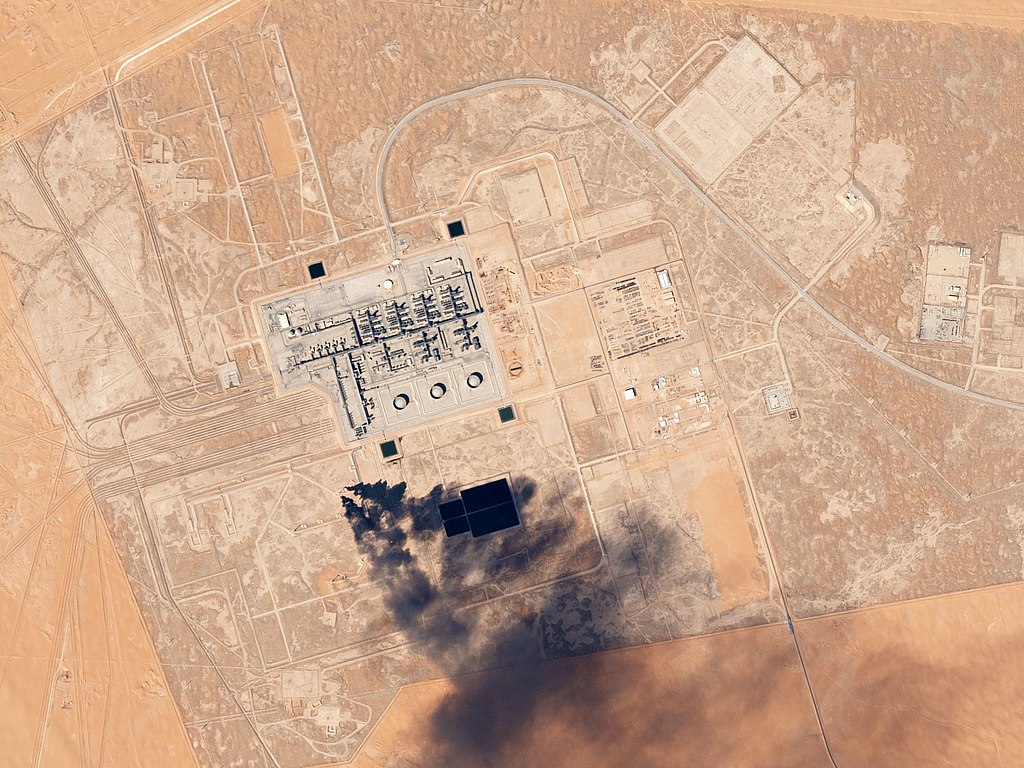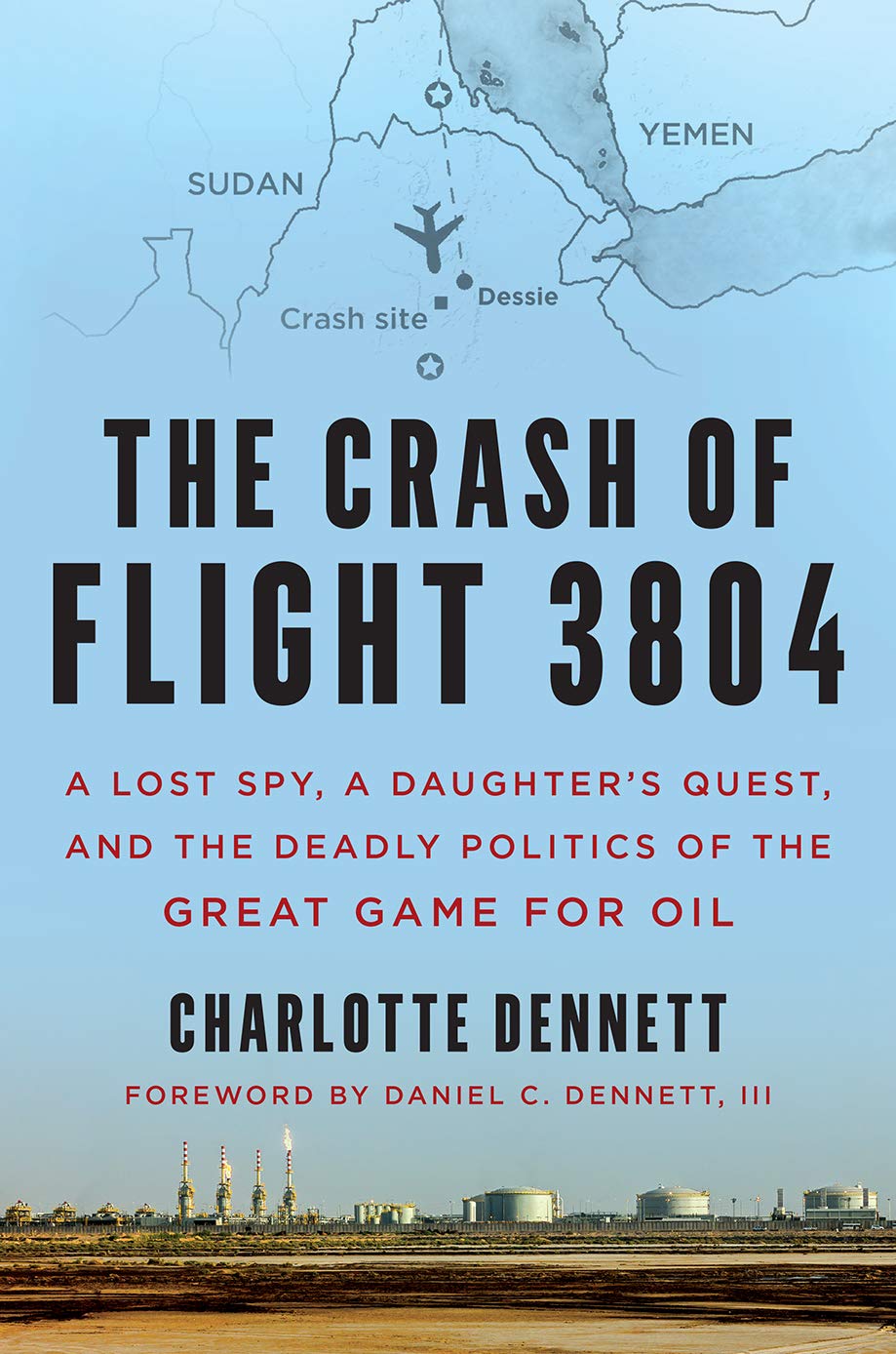By Frank Kaminski. Originally published by Resilience.
The Crash of Flight 3804 is a triumph on two fronts. First, it’s a comprehensive history of U.S. involvement in the Middle East that manages the uncommon feat of placing this history into its proper context: America’s need for Middle Eastern oil. It also serves as an exciting, moving account of author Charlotte Dennett’s decades-long journey to expose the truth behind her father’s death. Her father, Daniel Dennett, was a U.S. counterintelligence agent stationed in Beirut, Lebanon, during and after World War II, and his job was to protect oil and other American interests from fierce competition from America’s wartime allies. In his daughter’s view, this likely led him to become one of America’s first victims of “the Great Game for Oil,” as she calls it.
Daniel Dennett worked for the Office of Strategic Services (OSS), a precursor to the Central Intelligence Agency (CIA), under the alias “Carat.” He died in March 1947 when the military transport plane on which he was traveling flew into a mountain in Ethiopia. His mission that day was to deliver a load of top secret radio equipment and an aerial camera (tools critical to mapping oil-bearing terrains and identifying potential pipeline routes) to the American legation in Ethiopia’s capital city, Addis Ababa. Officially, the crash was blamed on bad weather that obscured the mountain from view. However, as Charlotte would come to learn, the chief crash investigator expressed skepticism of this explanation and left open the possibility of sabotage.
Charlotte’s pursuit of the truth began nearly 50 years ago, when she was a correspondent in the Middle East. She began making annual trips to the U.S. National Archives to read through declassified reports her father had written for the OSS. In part, this was her way of getting to know her father, as she had been too young at the time of his death to have known him while he was alive. But what mostly drove her was a need to know more about her father’s top secret work and what really caused his crash. A researcher’s researcher, she scoured books, newspaper archives and oil pipeline maps; contacted her father’s former CIA colleagues; became a seasoned Freedom of Information Act (FOIA) requester; interviewed surviving relatives of the plane pilot; and drew on her own invaluable insights as a Middle East reporter.
The Crash of Flight 3804: A Lost Spy, a Daughter’s Quest, and the Deadly Politics of the Great Game for Oil
By Charlotte Dennett
368 pp, hardcover. Chelsea Green Publishing – Apr. 2020. $27.95.
While Charlotte admits she still lacks hard proof that her father’s plane was sabotaged, she does convincingly argue that this is a plausible scenario within the context of the Great Game. She points to numerous instances of assassination attempts, regime change, war and mass death that can be directly attributed to America’s and other big players’ willingness to keep the oil flowing “at all costs.” And she’s identified multiple motives and potential perpetrators of an assassination against her father. Britain and Russia had an interest in taking Daniel Dennett out of the picture, given that both nations were in cutthroat competition with America for control over Middle Eastern oil.
The mystery of who Daniel Dennett was as a person proved just as fruitful for Charlotte as that of how he met his end. Through interviews with those who knew him, letters of condolence to his family from his former professors at Harvard and the written words of Daniel himself, Charlotte reveals him to have been a man of towering intellect and humanity. He was a distinguished scholar of Islam whose books are still widely read. He spoke Arabic fluently, knew the Quran and had great sensitivity toward the people of the Middle East. One of his former professors described him thus: “He seemed to me to represent the best New England traditions: open mindedness, fairness, tolerance, [and] humaneness and did not depart from them in the most trying times.” In its unraveling of the legend of Daniel Dennett, this book is as fascinating as the 1941 film Citizen Kane (in which a journalist talks with survivors of a recently deceased tycoon to gain insight into him).
As Charlotte continued digging into the circumstances surrounding her father’s death, a number of additional research questions emerged. Some of these can be gleaned from chapter titles; for instance: “Bush’s Oil and Pipeline Wars: The Most Censored Story”; “Is the Syrian War a Pipeline War?”; “The Hidden History of Pipeline Politics in Palestine and Israel”; “Pipeline Politics, Assassinations, and the West’s War on Yemen.” As evidenced by these examples, a common thread is how critical pipelines are to Middle Eastern geopolitics. Indeed, they are so crucial that Charlotte has found herself coining the adages “Follow the pipelines” and “A pipeline map is worth a thousand words.”
The book is meticulous in the way it goes about making connections between pipeline projects and conflicts in various regions where these projects have been carried out or proposed. Drawing on extensive documentary evidence, interviews with experts and, once again, pipeline maps, it cogently lays out how the Bush administration’s true reason for invading Afghanistan in October 2001 was to advance the commercial interests of U.S. oil company Unocal, which was integrally involved in the proposed Turkmenistan-Afghanistan-Pakistan-India (TAPI) Pipeline. As for the ongoing war in Syria that began in 2011, it centers around two competing proposals to pipe natural gas through Syrian territory, one by the pro-American emir of Qatar and the other by Iran’s pro-Syria president—with Syrian President Bashar al-Assad having rejected the Qatari pipeline in 2009 in favor of the Iranian one.
The most tragic feature of the Big Game to be glossed over in most histories—but not this one—is its true cost in human lives. The deaths run into the millions and extend well beyond casualties inflicted by the oil wars of recent times. As Charlotte points out, oil politics played a prominent role in the West’s failure to rescue millions of European Jews from the Holocaust. The American government knew by 1943 of the genocide taking place in Germany, but Saudi King Ibn Saud let it be known that America would be putting its Saudi Arabian oil concession in jeopardy if it released Jews into Palestine. Charlotte observes that even at the time, many Holocaust captives sensed an oil connection to the West’s failure to take appropriate action. She quotes a poignant slogan shouted by escapees during protests in which many of them took part in Palestine: “No blood for oil!”
So thorough is the censorship regarding U.S. dependence on Middle Eastern oil that the mere mention of oil is routinely scrubbed from mainstream American discourse about the Middle East. We learn that when Daniel Dennett first came to Lebanon, it was popularly referred to as the “Gateway to the Middle East,” but that he and the oilmen he knew in the region believed it could more accurately be described as the “Gateway to Middle East Oil.” Similarly, the 1920 treaty originally known as the San Remo Agreement on Oil (which redefined the boundaries of the Middle East following World War I) has been recorded into history books as simply the San Remo Agreement. And when President Harry Truman announced his Truman Doctrine, it was purported to be aimed at containing Soviet expansion in general, when in fact it was secretly intended to specifically curb Soviet expansion into the Middle Eastern oil patch. (All references to oil were carefully removed from Truman’s Congressional address beforehand.)
As a reporter living and working in what she came to regard as “the most censored region in the world,” Charlotte had the curse of being privy to the truth but not being permitted to tell as much of it as she would have liked. Consequently, much of her material wound up in a file she called “What Charlotte couldn’t write.” One of the virtues of this book is that it provides an outlet for these firsthand journalistic accounts, which in turn add texture and a people’s-history feel to the greater story the book is telling.
They also make the book quite thrilling, for Charlotte reveals that much like her father, she carried out her work in the Middle East at great personal risk. To me, her most riveting story—and the one most emblematic of her character—is one in which she refuses to quit doing her job even as sniper bullets whiz past her and a tank prowls close by. She’s in a taxi when she sees the oncoming tank, its turret spinning wildly in search of a target. She flees and takes refuge under a desk in what appears to be an elementary school classroom. While everyone around her is panicking, Charlotte, ever the dedicated journalist, is diligently recording her observations in her reporter’s notebook.
In her concluding remarks, Charlotte makes no bones about America’s future prospects as a player in the oil game. She sees America steadily losing ground as the costs of its empire and its endless oil wars inexorably mount, and as more and more countries make deals with its oil-rich adversaries. She does see silver linings to the inevitable waning of America’s empire, chief among them a significant curtailment of greenhouse gas emissions that would result from a downscaling of the U.S. military (which ranks first among the world’s largest institutional oil consumers, and is thus also one of the biggest greenhouse gas emitters). Public awareness about all these issues is still sorely needed, but Charlotte sees signs that it’s rapidly increasing as modern-day communication technology strips away “the straitjacket on truth in the Middle East.”
The book ends with a coda that brings the story of Charlotte’s father up to last spring. In a further testament to her skill as a storyteller, Charlotte uses scenes to recount the latest victories in her search for the truth, plus a surprise move by the CIA to give long-overdue recognition to her father’s service and valor. Just like the rest of the book, this ending doesn’t fail to intrigue or emotionally involve us.
Main image: Khurais Oil Processing Facility, Saudi Arabia, February 4, 2017. Credit: Planet Labs, Inc., CC BY–SA 4.0
Subscribe to our newsletter
Stay up to date with DeSmog news and alerts







